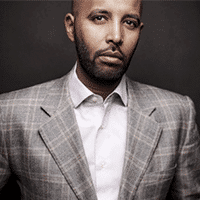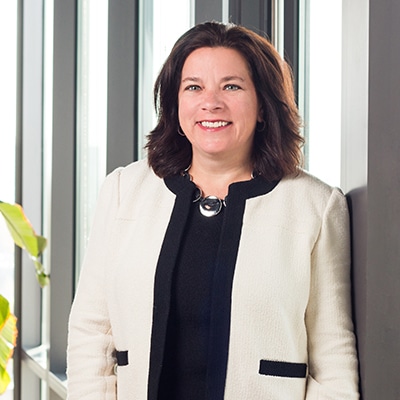GBQ represents clients ranging from start-ups to public companies, and in dozens of industries. Those companies often have very diverse needs. In the last two years, though, one common issue has landed front and center for every business, of every size — finding and retaining talent.
We know that business owners and their teams are struggling just to get the work done right now, and we hear many stories of office and executive-level employees covering shifts in production and customer-facing roles in order to keep businesses running. That doesn’t leave much time to focus on alternate sources of talent.
The traditional processes for finding employees just aren’t working. GBQ brought four experts together in a recent webinar to share resources and success stories that may spark ideas and opportunities to further empower growth of your business.
 Kelly Fuller, VP of Talent & Workforce Development at the Columbus Chamber
Kelly Fuller, VP of Talent & Workforce Development at the Columbus Chamber
Kelly’s role at the Columbus Chamber (Chamber) is to connect businesses to resources and best practices on the broad topic of workforce and to assist small businesses through the entire lifecycle of HR – finding talent, hiring, onboarding, upskilling, retaining, providing benefits, and exits. Not surprisingly, most of her time over the last two years has been focused on the talent shortage. She connects businesses to non-traditional recruiting methods and pools of talent, such as immigrant and refugee populations, emerging talent – including direct hires from high school and adult learning programs – workers who may have background issues, and adults with disabilities. Prior to working at the Chamber, Kelly spent 17 years in the career tech space at Eastland-Fairfield Career Center.
Business owners have to think in nonconventional ways, because right now there’s competition everywhere. We can’t just keep escalating pay rates because it gets to a point where you can’t compete or continue to raise prices to get there. So you have to creatively figure out how to get people in the door by competing from a culture standpoint. You have to change the little things, one person at a time, to provide an environment where people feel comfortable. I think that’s the key to all of this. We can all have the same pay rates. We can all have the same supervisor level or the same benefits. But, it all comes down to how you treat people.
 Tariq Mohamed, Director of Refugee Social Services, Jewish Family Services
Tariq Mohamed, Director of Refugee Social Services, Jewish Family Services
In his 20-year career at Jewish Family Services (JFS), Tariq has placed thousands of clients with central Ohio employers. Throughout his career, Tariq has served as a liaison between employers and refugees, offering cultural training to refugees to prepare them for the workplace, and also to employers, to help them understand how to manage this strategically important labor force. The team at JFS speaks a dozen languages and they work to create recruiting, onboarding, and training programs that are targeted to the populations that really need jobs, and they expedite that process. Tariq is quick to remind everyone not to let the name of his agency fool you – JFS serves the entire community.
As a refugee myself, I can wear two hats at the same time by solving refugee issues or immigrant issues, but also taking care of the American cultural clues. As an example, some of the practices that companies do these days are creating barriers for applicants, like behavioral-based questionnaires, or applications that are difficult to understand. So, what we do is simplify that process. We talk to the company, we talk to our business partners and say, this really doesn’t apply to a lot of people that you want to hire. If you want to bring people on board quickly, we also shorten the gap of the drug testing or other processes that tend to take a long time. People in poverty are desperate when they are applying for a job, they’re don’t have the luxury to wait for weeks to get the job. Once we talk to the company and help them to understand those things, they generally do listen, and they tend to really partner with us very well.
 David Cofer, Director, Partnerships & Programs, Columbus State Community College
David Cofer, Director, Partnerships & Programs, Columbus State Community College
David works within the Office of Talent Strategy at Columbus State Community College (CSCC), which is the employer-facing part of the college. David and his team serve as a bridge and connection to the local business community, who are looking for talent, which encompasses work-based learning opportunities, internships, clinics, and certifications. David manages CSCC’s “earn and learn” programs where students work and go to school simultaneously in a way that the two are synced toward the student’s desired career path.
Accelerated training centers (ATCs) are a very new initiative of ours. We are setting these up in the community; we want to combat accessibility. These are going to be extremely quick opportunities in a matter of a couple of weeks for individuals to gain access to the skills they need for solid entry-level employment. The target is folks who are either unemployed or, by their own evaluation, underemployed. And they’re in the industry sectors that you might expect: customer service roles, warehousing and logistics and distribution, as well as manufacturing. And again, to be clear — in the matter of two, three or four weeks, you’re not making your way into mid-level management, but you are maybe getting out of a dead end nowhere entry-level position and moving forward.
 Brian Lehman, Human Resource Manager, Universal Veneer
Brian Lehman, Human Resource Manager, Universal Veneer
Brian has a long history in the HR field in a variety of companies and industries. In his current role, Brian has been responsible for finding new sources of talent for the business and building a supportive and inclusive environment for refugees to thrive at Universal Veneer, a custom manufacturer of wood veneer in Licking County.
Especially after the pandemic, conventional ways to recruit over the last 25 or 30 years that I’ve been in the industry just don’t work anymore. I reached out to Community Refugee Immigration Services (CRIS) and Jewish Family Services in Columbus and I said, “Hey, I know you have connections to new Americans and I know it’s going to be a challenge to try to get them to come to Licking County. Let’s have a conversation.” We created a retention program which provides bonuses for attendance on a graduated scale in the first few months. This gives them the opportunity to earn a few thousand dollars in bonuses because we want them be invested with us. Part of our strategy behind that was to get them to our 60-day window where we could get them on our benefit programs. I’m happy to say that about 90% of those first refugees we hired in May of 2021 are still working here.
Access our “Rethinking Talent Solutions and Workforce Development” webinar recording by clicking here.
